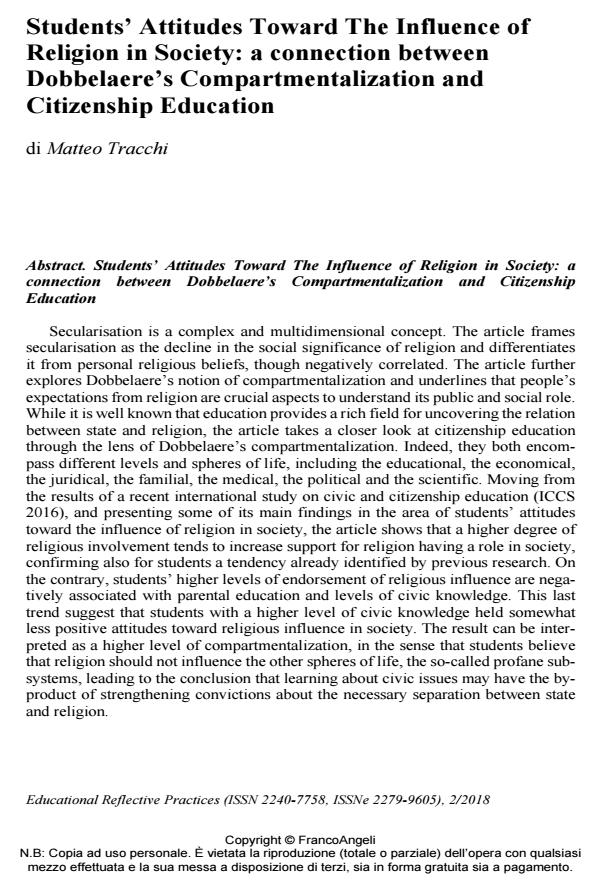Students’ Attitudes Toward The Influence of Religion in Society: a connection between Dobbelaere’s Compartmentalization and Citizenship Education
Titolo Rivista EDUCATIONAL REFLECTIVE PRACTICES
Autori/Curatori Matteo Tracchi
Anno di pubblicazione 2019 Fascicolo 2018/2
Lingua Inglese Numero pagine 14 P. 244-257 Dimensione file 192 KB
DOI 10.3280/ERP2018-002016
Il DOI è il codice a barre della proprietà intellettuale: per saperne di più
clicca qui
Qui sotto puoi vedere in anteprima la prima pagina di questo articolo.
Se questo articolo ti interessa, lo puoi acquistare (e scaricare in formato pdf) seguendo le facili indicazioni per acquistare il download credit. Acquista Download Credits per scaricare questo Articolo in formato PDF

FrancoAngeli è membro della Publishers International Linking Association, Inc (PILA), associazione indipendente e non profit per facilitare (attraverso i servizi tecnologici implementati da CrossRef.org) l’accesso degli studiosi ai contenuti digitali nelle pubblicazioni professionali e scientifiche.
Secularisation is a complex and multidimensional concept. The article frames secularisation as the decline in the social significance of religion and differentiates it from personal religious beliefs, though negatively correlated. The article further explores Dobbelaere’s notion of compartmentalization and underlines that people’s expectations from religion are crucial aspects to understand its public and social role. While it is well known that education provides a rich field for uncovering the relation between state and religion, the article takes a closer look at citizenship education through the lens of Dobbelaere’s compartmentalization. Indeed, they both encompass different levels and spheres of life, including the educational, the economical, the juridical, the familial, the medical, the political and the scientific. Moving from the results of a recent international study on civic and citizenship education (ICCS 2016), and presenting some of its main findings in the area of students’ attitudes toward the influence of religion in society, the article shows that a higher degree of religious involvement tends to increase support for religion having a role in society, confirming also for students a tendency already identified by previous research. On the contrary, students’ higher levels of endorsement of religious influence are negatively associated with parental education and levels of civic knowledge. This last trend suggest that students with a higher level of civic knowledge held somewhat less positive attitudes toward religious influence in society. The result can be interpreted as a higher level of compartmentalization, in the sense that students believe that religion should not influence the other spheres of life, the so-called profane sub-systems, leading to the conclusion that learning about civic issues may have the by-product of strengthening convictions about the necessary separation between state and religion.
Matteo Tracchi, Students’ Attitudes Toward The Influence of Religion in Society: a connection between Dobbelaere’s Compartmentalization and Citizenship Education in "EDUCATIONAL REFLECTIVE PRACTICES" 2/2018, pp 244-257, DOI: 10.3280/ERP2018-002016